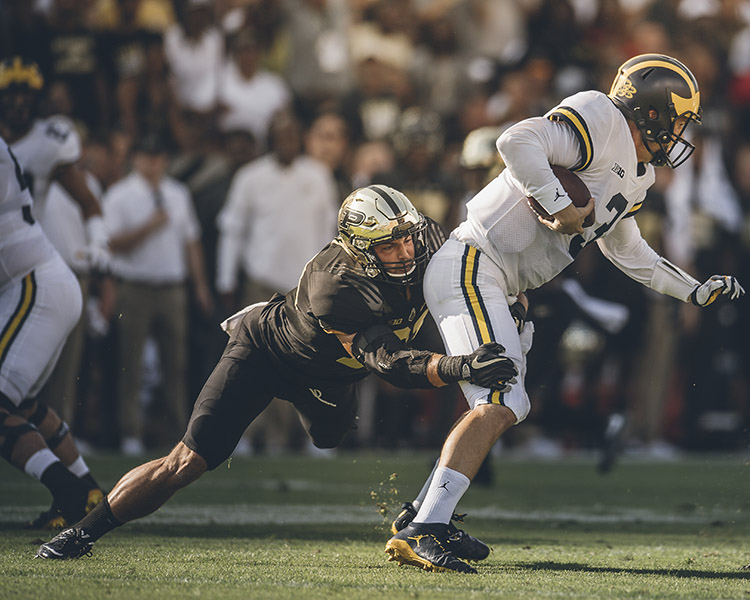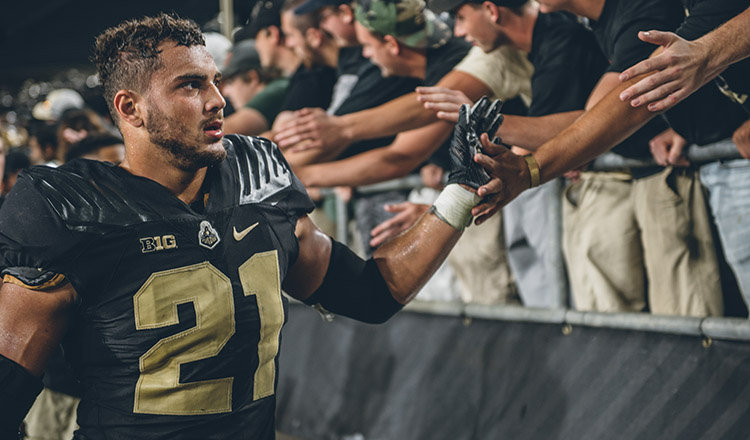Relentless drive for perfection fuels linebacker Markus Bailey
Markus Bailey was 6 years old when his world came crashing down. The eldest of two sons has nothing but fond memories of those prior early years. His parents, Demarko and Amy Bailey, were still in high school when Markus was born. He recalls a loving home anchored by hardworking parents who were putting themselves through community college while raising him and his younger brother, Isaac.
“They weren’t financially in a situation to raise a kid and have a family,” Bailey says. “When life hits you like that, you adapt to the situation and make the best of it.”
Demarko owned a business selling high-end vacuum cleaners. Amy poured herself into caring for her two sons. “They wanted to guide us on a path that was different than theirs,” Bailey says. “That’s a testament to how unselfish they were. They put me and my brother first. They were so young, but it wasn’t about them anymore. They gave up everything in their lives for us.”
Money was tight, but theirs was a happy family. Until November 18, 2003, when Demarko was murdered at age 24.
“My dad was a great guy whose life was taken from him way too soon,” Bailey says. “It’s given me a chip on my shoulder because I didn’t get the chance to have my father with me. It pushes me to excel for my family. I want to show the good that can come out of a disadvantageous situation.”
Following their father’s death, the brothers went to live with Demarko’s sister and her husband for five years. Shekera and Richard McCluskey provided a stable and supportive home during a confusing and tumultuous time.
“They have two children themselves, but they took us in as their own,” Bailey says. “They refer to me and my brother as their kids.”
It was his uncle who started Bailey playing football. It wasn’t a natural fit for a chubby 7-year-old who lacked the motivation to excel in athletics. “I didn’t understand the concept of hard work or the contact of the sport,” Bailey says. “I didn’t like pushing my body or getting hit.”
Bailey wanted to quit after his first season, but his uncle kept pushing him to play. As Bailey’s youth football coach, McCluskey instilled the values of mental focus and physical discipline derived through athletics. As Bailey’s body developed and he better understood the rules of the game, football started to be fun.
“My first big play, I got a sack in defense,” Bailey says. “The play before, I had messed up really bad, and I was super upset. My uncle was yelling at me. It was like the scene from The Waterboy. I took off and sacked the quarterback. I was about 8 years old.”
Bailey admits he still struggles with tempering his emotional response following a bad play. “It’s an ongoing issue for me, having confidence,” he says. “I am a perfectionist. If I miss a tackle or otherwise mess up a play, I get down on myself. When I first came in, it would throw me off my game. This past season, I’ve gotten a lot better at it.”
He’s had to. As the seasoned linebacker on the team, he has the most experience at the position coming in to the 2018 season. It’s a leadership role that Bailey is ready to take on.
“Now, when I mess up, I have to bounce back. Younger players are going to feed off me. I can be upset. I can show that I care, but I can’t change my whole attitude and show a lack of energy because I’m too in my head.”
Consumed by head games is exactly where Bailey found himself October 2016 when Penn State running back Saquon Barkley (a 2018 No. 2 draft pick) deftly evaded Bailey’s tackle in the first half, propelling the Nittany Lions to a 62–24 trouncing of the Boilermakers — a record number of points scored by an opponent in Ross-Ade Stadium. It was a tough blow for the redshirt freshman who had missed the majority of the 2015 season due to a knee injury.
“There was so much backlash from fans on social media. ‘Get Markus Bailey out of here, he’s trash. Barkley is too much for him. Can Markus Bailey make a tackle?’ That sucks, reading that,” Bailey says. “We got obliterated that game. After that, I was down on myself for a while. I didn’t know how I was going to make it to the next level.”

Bailey sought the expertise of a sports psychologist to help him sharpen his focus. “Seeing him for the past two seasons, working on visualization exercises to calm myself down, that helps me to perform better and respond better if I make a mistake or experience adversity.”
While he proved his mettle as a player last season, Bailey is equally determined to debunk dumb jock stereotypes off the field. Few things frustrate him more than people who discount his intelligence, presumably due to his 6-foot-1, 240-pound frame.
“There’s an unfortunate stereotype associated with athletes that they don’t care about school and are entitled to do whatever they want,” says the Academic All-Big Ten honoree. “That offends me. I will always go the extra mile to counteract that. I am proof that you can maintain your grades while maintaining your performance on the field.”
The redshirt junior is majoring in movement and sport sciences and minoring in psychology, law and society, and organizational leadership. Despite a demanding training schedule and full class load, he still finds time for a pickup game of Ping-Pong now and then. Who’s the best Ping-Pong player on the team? The quarterback, of course.
“I know it’s cliché,” Bailey says. “But David Blough is just really good. Although I can confidently say I’m in the top five. Anytime I can play, I will. It helps with football, improving your reaction times. There’s that perfectionism thing coming in again — perfecting the edge.”
It’s that constant competitive drive, the pursuit of perfectionism in everything Bailey does that carries him.
“I never thought I’d make it this far,” he says. “When I was playing in high school, I wanted to play in college. I didn’t know it was a possibility until I got my first offer letter. Now I’m a prominent player on defense. I am shattering old expectations I set for myself. It’s time to create some new ones.”

